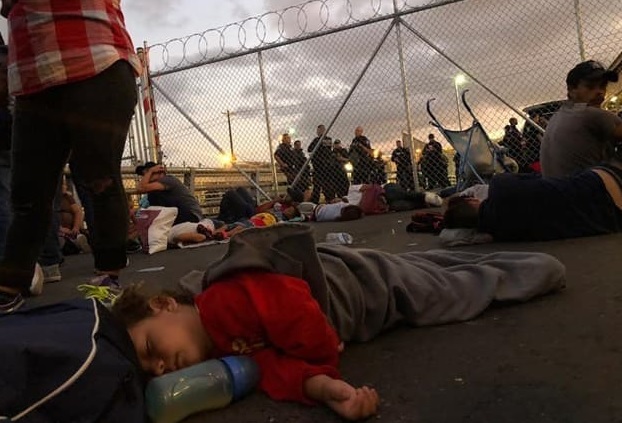MATAMOROS-BROWNSVILLE BRIDGE, U.S.-Mexico border, Oct 10 (Reuters) – U .S. asylum seekers camped out in a dangerous Mexican border town occupied a bridge to Brownsville, Texas on Thursday, leading to the closure of the crossing, witnesses and authorities said.
Hundreds of the migrants have been camped for weeks on the end of the bridge in Matamoros, Mexico, a city known for cartel control of people trafficking and gang violence.
Many of those camped out are awaiting court dates for hearings in the United States weeks or months later under a U.S. policy called the Migrant Protection Protocols (MPP).
Video shot by a Reuters photographer showed men, women and children, some lying on blankets, mid-way across the bridge over the Rio Grande. The path into the United States was blocked by a razor wire-topped gate, behind which stood dozens of U.S. border agents.
Some on the bridge said they were trying to cross as a group into the United States, and were frustrated that court dates kept on being pushed backwards, leaving them uncertain of how long they would be stuck in Mexico.
“We want to argue to cross over – we didn’t ask to be in Mexico, they sent us here unjustly,” said a man who declined to give his name. He said he had a court date in the United States.
Elias Rodriguez, public affairs liaison for U.S. Customs and Border Protection in Brownsville, confirmed the bridge had been shut for what seemed to be a small protest but said it was still unclear what happened and when.
Rodriguez said there had been no violence.
More than 51,000 migrants, mostly asylum seekers, have been returned to Mexico under MPP. At least 8,000 have been sent to Matamoros, a border city in crime-wracked Taumaulipas state, since the policy was expanded in July from other parts of the U.S.-Mexico border.
MPP migrants who have been living in tents or on sidewalks at the end of the bridge, reliant on food from volunteers and water for washing from the river, recently expressed concerns to Reuters that their court dates would be cancelled or indefinitely postponed.
Their sense of uncertainty comes amid news of shifting U.S. policies. The U.S. Supreme Court issued a decision last month that would allow the U.S. government to deny asylum to people who have passed through a third country, such as Mexico, and not requested refuge there first.
REUTERS

